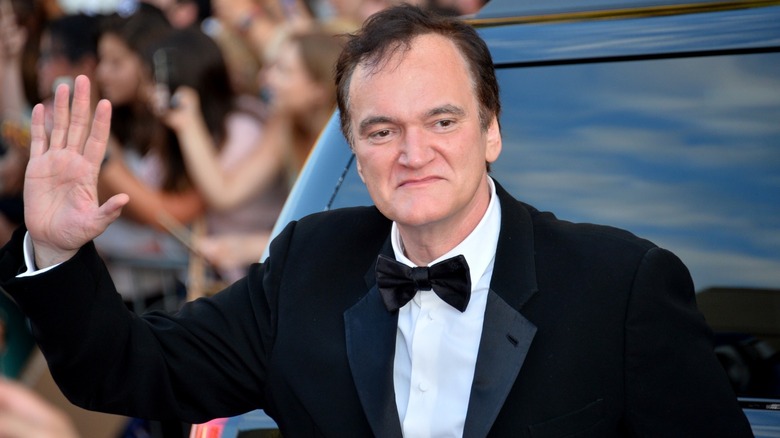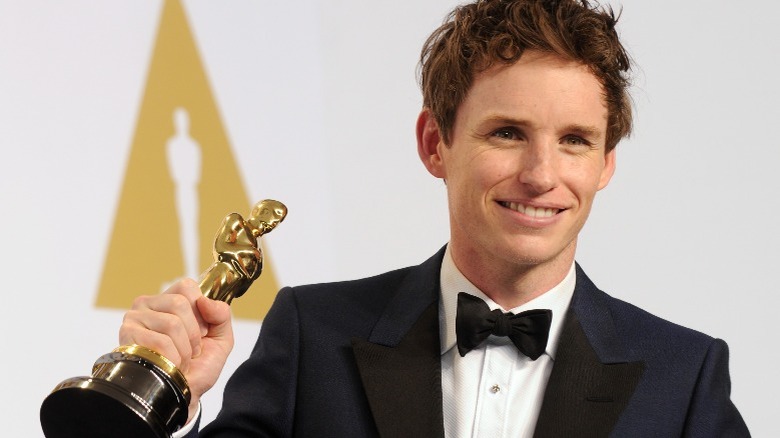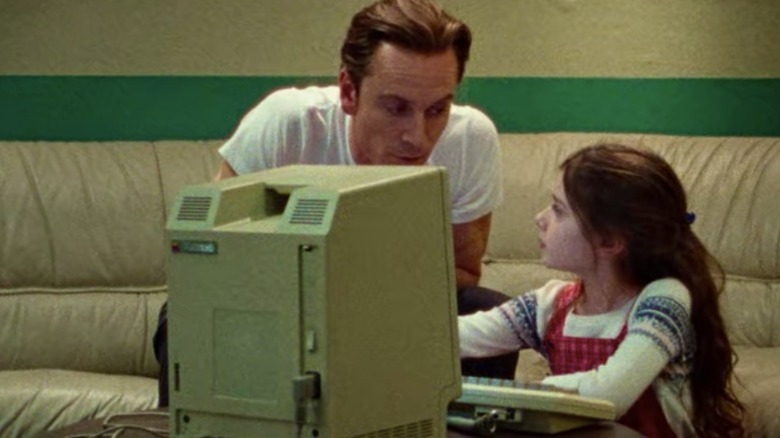Why Quentin Tarantino Has A Problem With Biopics
Biopics are generally a favorite of Hollywood and the Oscars because they tend to be actor showcases — plus, as Variety mentioned in an article last year, they "can hopefully short-cut years of development that include endless notes about how the plot should change," because the events being depicted really happened (more or less). Kristen Stewart's take on Princess Diana in "Spencer" and Will Smith's performance in "King Richard" as Richard Williams, the confident and obsessive father of tennis legends Serena and Venus, are garnering huge acclaim and were labelled early frontrunners for awards by prognosticators specifically because the characters they're playing are real people. It's this kind of enthusiastic, awards-driven acclaim that drives some biopic skeptics to roll their eyes — including "Pulp Fiction" director Quentin Tarantino, who spoke about his dislike for biopics with The Talks Magazine.
The term biopic is an amalgamation of the words "biography" and "epic." The biographical part is self-explanatory, but the "epic" part comes in when the concern is to tell the entire or majority life story of a single individual. This tends to make these movies long, arduously paced, and primarily actor showcases wherein the focus of the narrative aims to get as much charisma and showmanship out of a performance as possible (even though that usually doesn't work). As Tarantino puts it, "they are just big excuses for actors to win Oscars." Especially in Hollywood, biopics tend to follow a well-worn structure, often opting for hitting on dramatic points of a life rather than digging deeper into the subject themselves.
Biopics Shouldn't Be a Timeline of Events
Quentin Tarantino's main gripe with the genre, which he singles out along with costume dramas as ones he does not like, is that "even if they're the most interesting person...if you're telling their life from beginning to end, it's going to be a boring movie." I agree with this, having sat through several major awards-season hopeful biopics like 1996's "Shine," 2009's "Amelia," 2014's "The Theory of Everything" and "The Imitation Game," and 2016's "Snowden." These films all play it safe, choosing to churn out a monotonous timeline of events of their subjects' lives that drags for two or more hours (except "Shine" — that movie was thankfully only 90 minutes).
Tarantino is also absolutely correct about these movies being fully geared towards trying to win actors Oscars, which often renders them not only unimaginative, but often times insulting and offensive. I remember "The Theory of Everything" having more than a few cloying sequences aimed at squeezing sympathy for Stephen Hawkins' debilitating disability which rendered him unable to walk or talk. I watched Eddie Redmayne painfully try to climb steps while mumbling incoherently and all I thought was how distasteful it all was. Despite the movie being two hours, not a single moment felt like it was truly dedicated to the man's brilliant psyche, even though his ideas and theories (literally part of the title of movie) are what made him an important figure. But I guess going into the mind of a theorist and philosopher can't quite milk out an Oscar-bait performance (Redmayne won, of course) like pretending to be a disabled person.
Taking A Riskier Narrative Approach
Yet, some traditional biopics are movies that I hold dear to my heart. Richard Attenborough's "Gandhi" from 1982 and its equal companion, Shyam Benegal's "The Making of the Mahatma" from 1996, are both sprawling depictions of Gandhi's life which also double as historical dramas recounting the political and social tribulations of India under its struggle for independence from the British Empire. Similarly, there's Steven Spielberg's "Lincoln" from 2012, in which Daniel Day-Lewis delivers a reliably rousing performance, but Spielberg's movie narrows the focus to a specific stretch of Abraham Lincoln's time in office: his struggle to gain support for ratifying the 13th amendment. These are perhaps biopics Quentin Tarantino would give passes to as well.
Tarantino goes on to say that he believes biopics should be done like a "comic book version of a life ... don't make a movie about a whole life, make a movie about one day." Perhaps 2014's "Steve Jobs", directed by Danny Boyle, is more his speed. The film was written by Aaron Sorkin, and is one of my favorite examples of a small-scale biographical film. It has three total scenes, each taking place right before a different Apple launch event: one in 1984, one in 1988, and one in 1998. Each launch event presents Jobs (Michael Fassbender) at a different point in the company's life-cycle and reveals his egomania, childhood memories, and troubled relationship with his daughter that gives the movie not only a psychological density, but ties his mind, words, and ideology directly to the tech that made him famous.
A Biopic or A Day in the Life?
In the interview, Tarantino suggests a biopic idea about Elvis Presley, saying, "Make a movie about the day Elvis Presley walked into Sun Records. That's a movie." Last year, Pablo Larrain's "Spencer" took a similar approach. I wasn't a huge fan of the film, but I found commendable the way it focuses on a single royal family retreat inside a palace and tapped into the anxieties and self-loathing of Princess Diana. That latter part is what makes or breaks a biographical film for me. While I think bringing down the scale of a biopic and focusing on what made the figure important should be the central aim, I also think it's important to tap into the person's mental state as much as possible. Look at the way 2003's "American Splendor" and 1991's "Kafka" meld the psychology and work of their artists into their actual life, blurring their realities with the fiction they wrote, which was always a part of their psyche. With Tarantino saying he will retire from filmmaking after ten movies, it sounds like a golden opportunity for him to make his ideal version of a biopic with his tenth and potentially final film.



